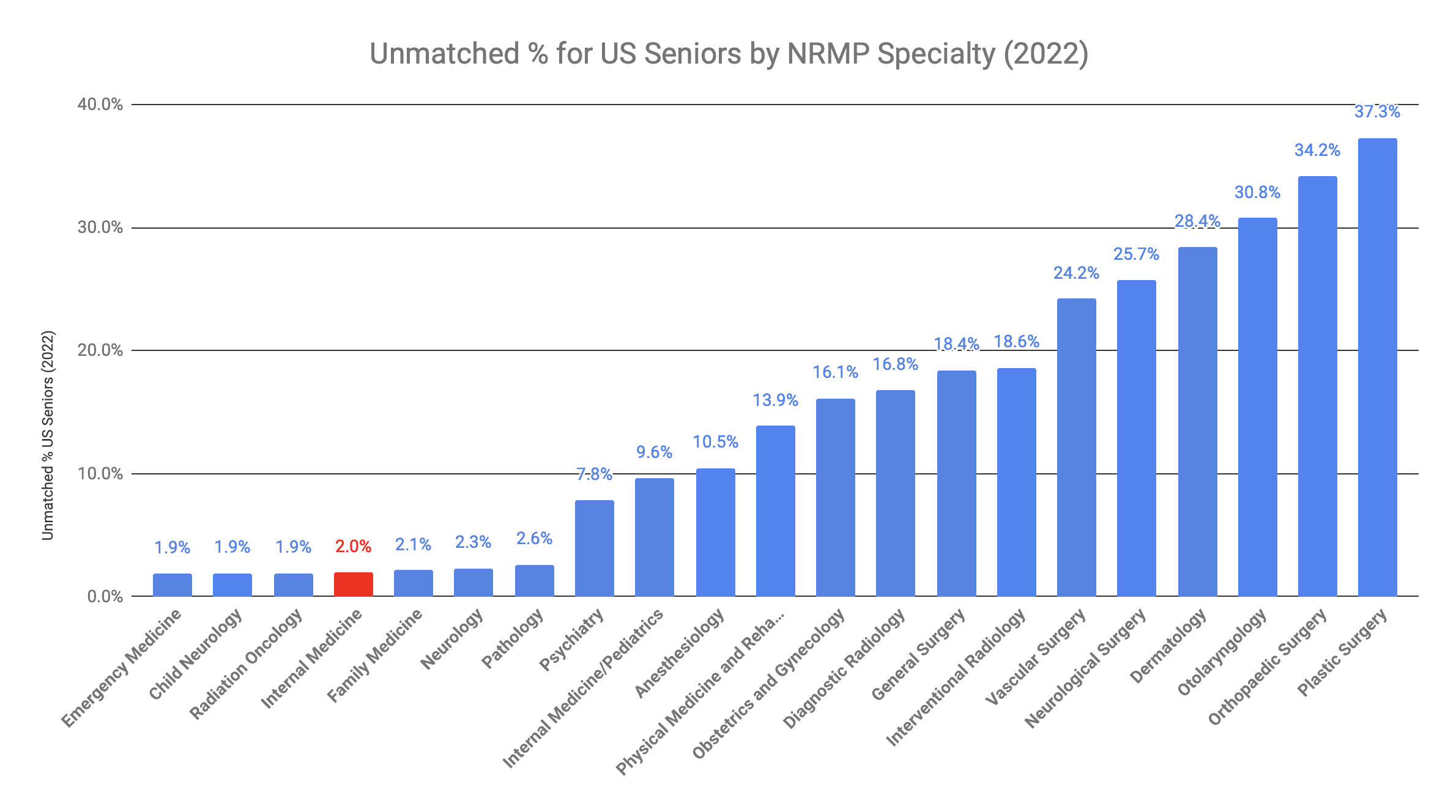
Do you want to know how to become an oncologist? Are you interested in a medical career that provides not only patient care but also offers unique opportunities for medical research and a chance to be on the cutting edge of modern medicine?
If so, an oncology career may be the perfect choice for you. This field offers a rewarding and challenging career path. In this blog post, I will explain what an oncologist does and how to become one, even if you’re only in high school.
Summary:
- Oncologists specialize in diagnosing and treating patients with cancer either by radiation, chemotherapy, or surgery.
- Oncology is a sub-specialty of internal medicine. Internal medicine residency training is three years, in addition to 2-3 more years in an oncology fellowship.
- Going to a top medical school may help a bit. However, how you do on your USMLEs (Board) scores and in your medical school class ranking will matter more
- Non-PhD degrees like MBAs and MPHs appear to have no advantage or disadvantage to becoming an oncologist.
Table of Contents
What Are Oncologists?
Oncologists have a remarkable job: they diagnose and treat patients diagnosed with cancer. This can be such a life-altering diagnosis for patients. Not only do they need to understand the disease and treatment options but they also need to have compassion.
Oncologists have to understand the human body and its response to treatment deeply. There are various types of cancers and treatments, therefore, an oncologist has to know what treatments will provide the best chance of survival for the patient’s specific disease. They also have to understand the potential side effects of each treatment type and the impact that may have on the patient’s life.
Is an Oncologist a Doctor?
Are oncologists doctors? Of course! The answer to this question is yes; oncologists are doctors.
An oncologist is a specialized physician who has completed medical school, usually followed by a three-year internal medicine residency, in addition to two-three years fellowship in oncology. During this time, the oncologist trains to care for and manage patients undergoing treatment for cancer. This involves understanding treatments such as chemotherapy and immunotherapy.
Medical Oncology vs. Radiation Oncology: What’s the Difference?
Radiation Oncologists specialize in treating cancer patients using ionizing radiation. They usually use this therapy in conjunction with surgery and chemotherapy. A medical oncologist is trained to treat cancer using medications such as chemotherapy or immunotherapy
In summary, both are doctors who have completed medical school and a residency. They are experts in the care and management of patients undergoing cancer treatment. However, they specialize in different types of cancer treatment. A radiation oncologist specializes in radiation treatments for cancer, while a medical oncologist specializes in medical treatments.
How Long Does It Take To Become an Oncologist?
Becoming an oncologist is no easy feat and requires considerable time and energy. But if you’re up to the challenge, the results can be gratifying.
It takes between 13-14 years after high school to become an oncologist. That includes four years of undergraduate education, four years of medical school, three years of internal medicine residency, and two-three years of oncology fellowship. Along the way, you’ll have to take various standardized exams, including the SAT, the MCAT, and the USMLE Step 1 and Step 2 CK.
Undergraduate (4 Years)
The first step to becoming an oncologist is entering and completing an undergraduate program. This means taking the SATs and doing well enough to be accepted into a college or university. Once accepted into an undergraduate program, you’ll have to complete a minimum of four years of academic coursework. This includes classes in biology, chemistry, physics, English, and other general education courses.
Medical School (4 Years)
The next step is to take the MCAT, a standardized exam that measures your knowledge and skills in biology, chemistry, physics, and psychology. You’ll need to score well on the MCAT for med school acceptance.
You’ll have to complete four years of academic and clinical training during medical school. This includes classes in anatomy, physiology, pharmacology, pathology, and other medical topics. You’ll also have to complete clinical rotations at hospitals and other healthcare facilities to gain hands-on experience.
Internal Medicine Residency (3 Years)
Oncology is a sub-specialty of internal medicine, so you need to do an internal medicine residency to become an oncologist. After you’ve completed medical school, you’ll have to match into an internal medicine residency. To do this, you’ll have to take the USMLE Step 1 and Step 2 CK exams. These exams measure your knowledge and skills in the areas of clinical medicine. Once you’ve passed these exams, you’ll be eligible to apply for residency.
Once you’ve matched into an internal medicine residency, you’ll have to complete three years of clinical training to become qualified. During this training period and before specializing in oncological diseases, you’ll learn how to evaluate and manage several types of general medical conditions.
After Internal Medicine Residency: Board Certification
Oncologists should be board certified by the American Board of Internal medicine in internal medicine. Upon completing your internal medicine residency, you’ll be eligible to take the Internal Medicine Board Exam to become a board-certified internist which is required for you to later become a board-certified oncologist.
Oncology Fellowship (2-3 Years)
After you’ve completed medical school, you’ll have to match into a residency program. To do this, you’ll have to take the USMLE Step 1 and Step 2 CK exams. These exams measure your knowledge and skills in the areas of clinical medicine. Once you’ve passed these exams, you’ll be eligible to apply for residency.
After completing your internal medicine residency, you must complete an oncology fellowship for another two-three years. During this time, you’ll learn to prevent, diagnose, treat, and manage a wide range of oncological conditions. You will gain an in-depth understanding of the field of oncology in addition to performing oncological procedures and clinical research. Upon completing your oncology fellowship, you’ll be eligible to take the Internal Medicine Board Exam in oncology to become a board-certified oncologist.
After Oncology Fellowship: Licensing + Board Certification
Upon completing your residency, you’ll be eligible to apply for a medical license, a requirement for practice. You’ll also be able to take the Oncology Board Exam to become a board-certified oncologist. The kind of oncologist you want to be will determine which Board Exam you will take. While passing the oncology boards is voluntary, many employers will see this as important – or even necessary – for you to be employed as an oncologist.
Becoming an oncologist takes between 12-14 years after high school depending on what specialty you decide to do. It’s a long and arduous process, but if you’re dedicated and passionate about becoming an oncologist, the impact you can have is worth it.
How Competitive is it to Become an Oncologist?
Internal medicine is one of the less competitive specialties in matching into a residency program. Each year, thousands of hopeful medical school graduates apply for a limited number of positions in their preferred specialty. The Match system, run by the National Resident Match Program (NRMP), pairs applicants with training programs based on their preferences.
But how competitive is internal medicine in the US? To answer this question, looking at the unmatched rates of US seniors by specialty is important. The unmatched rate refers to the percentage of US seniors who applied for a residency program in that specialty but did not get matched. It considers each applicant’s first-choice specialty. So, if you applied to a different specialty as a “backup” but didn’t match because you matched in your first choice, this wouldn’t be included. To learn more about how to maximize your chances at a dream residency through “The Match,” see this article.
In the 2022 Match, graduating US medical school seniors attending MD schools had a 2.0% unmatched rate to internal medicine. This makes it less competitive than specialties like plastic surgery (unmatched % 37.3%), orthopedic surgery (34.2%), or otolaryngology (sometimes called “ENT” for ear-nose-throat; 30.8%).
For more on the competitiveness of internal medicine relative to other medical specialties, see this article.
Oncologist Annual Compensation
Oncologists have an average annual salary of $411,000. However, this can vary dramatically based on practice setting, specialty training, and experience level.
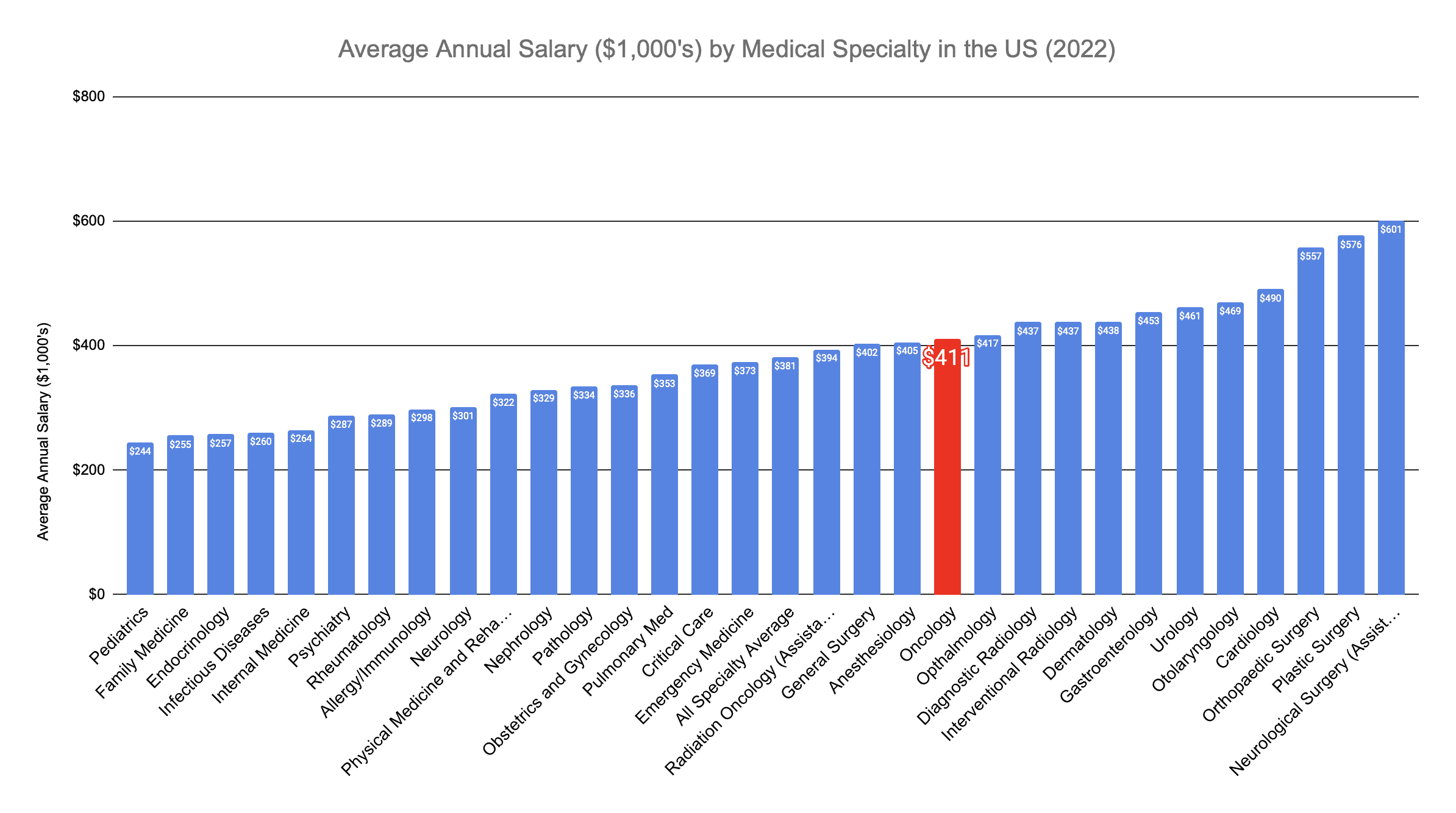
Oncologists make $411,000 per year on average
How Much Do Oncologists Make an Hour?
You may also be wondering, how much do oncologists make per hour? And how is the balance between time inside vs. outside the hospital for the specialty?
While there aren’t perfect data, we’ve compiled data re: hours/weeks worked and annual salary for various specialties, including oncology.
Here are the data:
| Average Annual Salary | Average Hourly Salary | On-Call Schedule | Hours/Week | Avg Weeks Worked/Year | |
|---|---|---|---|---|---|
| Allergy/Immunology | $298,000.00 | $125.93 | 49.3 | ||
| Anesthesiology | $405,000.00 | $146.24 | Medium | 61 | 45.4 |
| Cardiology | $490,000.00 | $177.54 | 57.5 | ||
| Critical Care | $369,000.00 | $114.91 | 66.9 | ||
| Dermatology | $438,000.00 | $211.11 | Low | 45.4 | 45.7 |
| Diagnostic Radiology | $437,000.00 | $170.46 | Low | 58 | 44.2 |
| Emergency Medicine | $373,000.00 | $169.59 | Medium | 46.4 | 47.4 |
| Endocrinology | $257,000.00 | $110.40 | Medium | 48.5 | |
| Family Medicine | $255,000.00 | $101.85 | Medium | 52.6 | 47.6 |
| Gastroenterology | $453,000.00 | $168.53 | Medium | 56 | 47.7 |
| General Surgery | $402,000.00 | $141.88 | High | 59.4 | 47.7 |
| Infectious Diseases | $260,000.00 | $101.44 | High | 53.4 | |
| Internal Medicine | $264,000.00 | $100.81 | Medium | 54.9 | 47.7 |
| Interventional Radiology | $437,000.00 | ||||
| Nephrology | $329,000.00 | $122.40 | Medium | 56 | |
| Neurological Surgery (Assistant Prof. Median) | $600,500.00 | $214.96 | Medium | 58.2 | |
| Neurology | $301,000.00 | $129.09 | Medium | 50.8 | 45.9 |
| Obstetrics and Gynecology | $336,000.00 | $123.26 | Medium | 58 | 47 |
| Oncology | $411,000.00 | $143.43 | Low | 59.7 | |
| Opthalmology | $417,000.00 | $173.97 | Medium | 51 | 47 |
| Orthopaedic Surgery | $557,000.00 | $207.91 | Medium | 57 | 47 |
| Otolaryngology | $469,000.00 | $184.01 | High | 53.1 | 48 |
| Pathology | $334,000.00 | $147.74 | Low | 47.1 | |
| Pediatrics | $244,000.00 | $108.16 | Medium | 47 | 48 |
| Physical Medicine and Rehabilitation | $322,000.00 | $147.76 | 45.4 | ||
| Plastic Surgery | $576,000.00 | $230.77 | Medium | 52 | |
| Psychiatry | $287,000.00 | $131.04 | Low | 46.5 | 47.1 |
| Pulmonary Med | $353,000.00 | $119.77 | Medium | 61.4 | |
| Radiation Oncology (Assistant Prof. Median) | $393,734.00 | $158.36 | Low | 51.8 | |
| Rheumatology | $289,000.00 | $112.33 | 53.6 | ||
| Urology | $461,000.00 | $172.49 | High | 58.1 | 46 |
| Total Average | $381,233.35 | $147.44 | 53.9 |
And the estimated physician salary per hour by specialty (oncology highlighted in red):
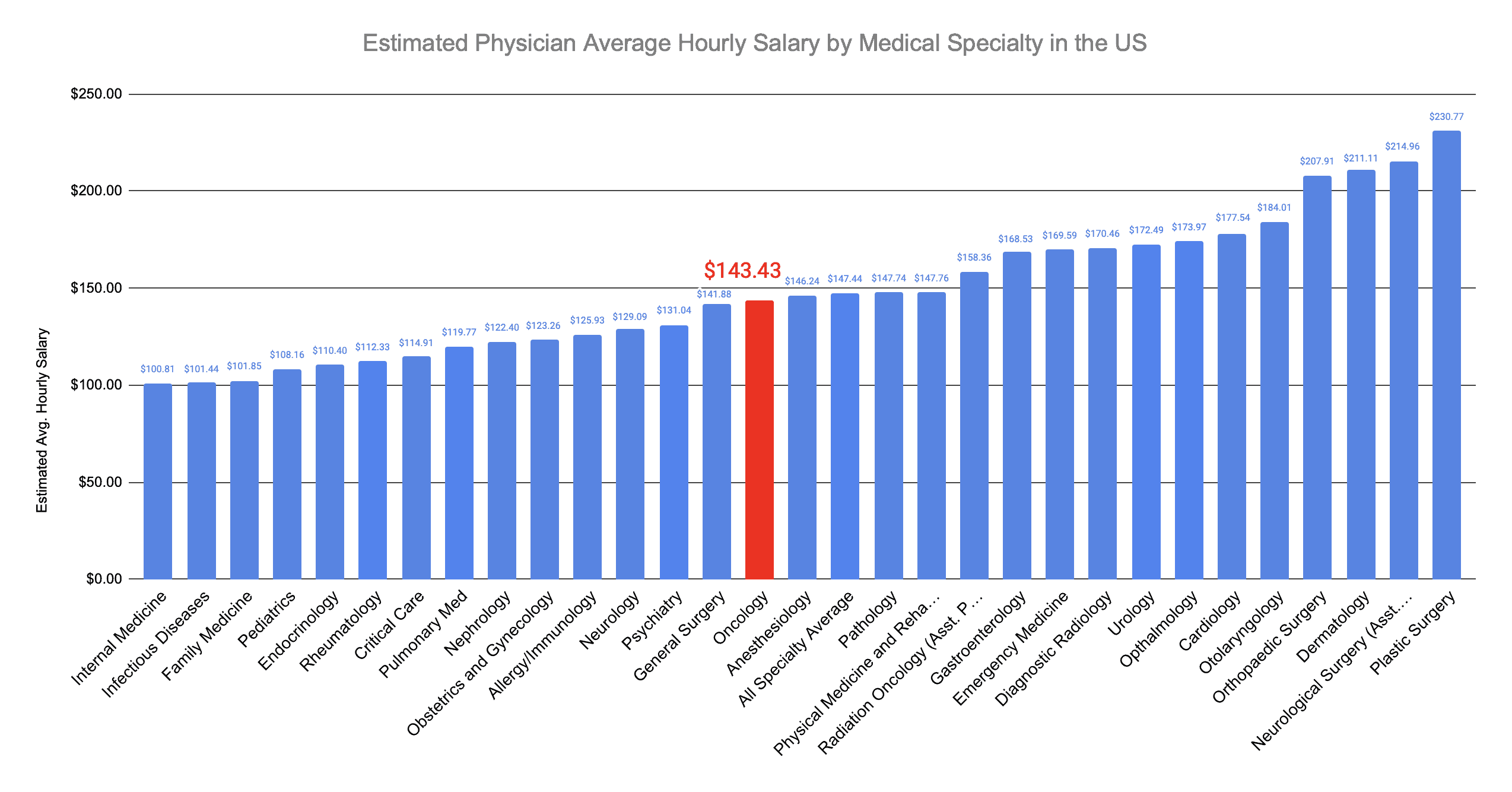
Oncologists make $143 an hour on average
Note: when data were unavailable for weeks worked per year, 48 weeks was used as an estimate to calculate the estimated hourly salary.
Getting AOA (Med School Honors) Helps in Becoming an Oncologist
Medical school is one of the most challenging aspects of becoming a doctor. Many medical schools have established Alpha Omega Alpha (AOA) branches to recognize top students’ hard work and dedication.
Alpha Omega Alpha (AOA) is the medical school honors society for students who excel in their studies and demonstrate an exemplary commitment to professionalism and leadership. Each medical school may elect up to 20% of their graduating class to be inducted into AOA.
Induction into AOA is a prestigious honor that carries with it a variety of benefits. AOA members may be eligible for special scholarships and fellowships and can often receive priority consideration for residency positions.
The AOA advantage is particularly notable for the most competitive fields and/or residency programs. The 2022 Match data showed that the match rate for US medical school seniors with AOA membership was 2% greater than that of US seniors without AOA membership in internal medicine. In other words, AOA membership provided a slight advantage to matching into an internal medicine residency.
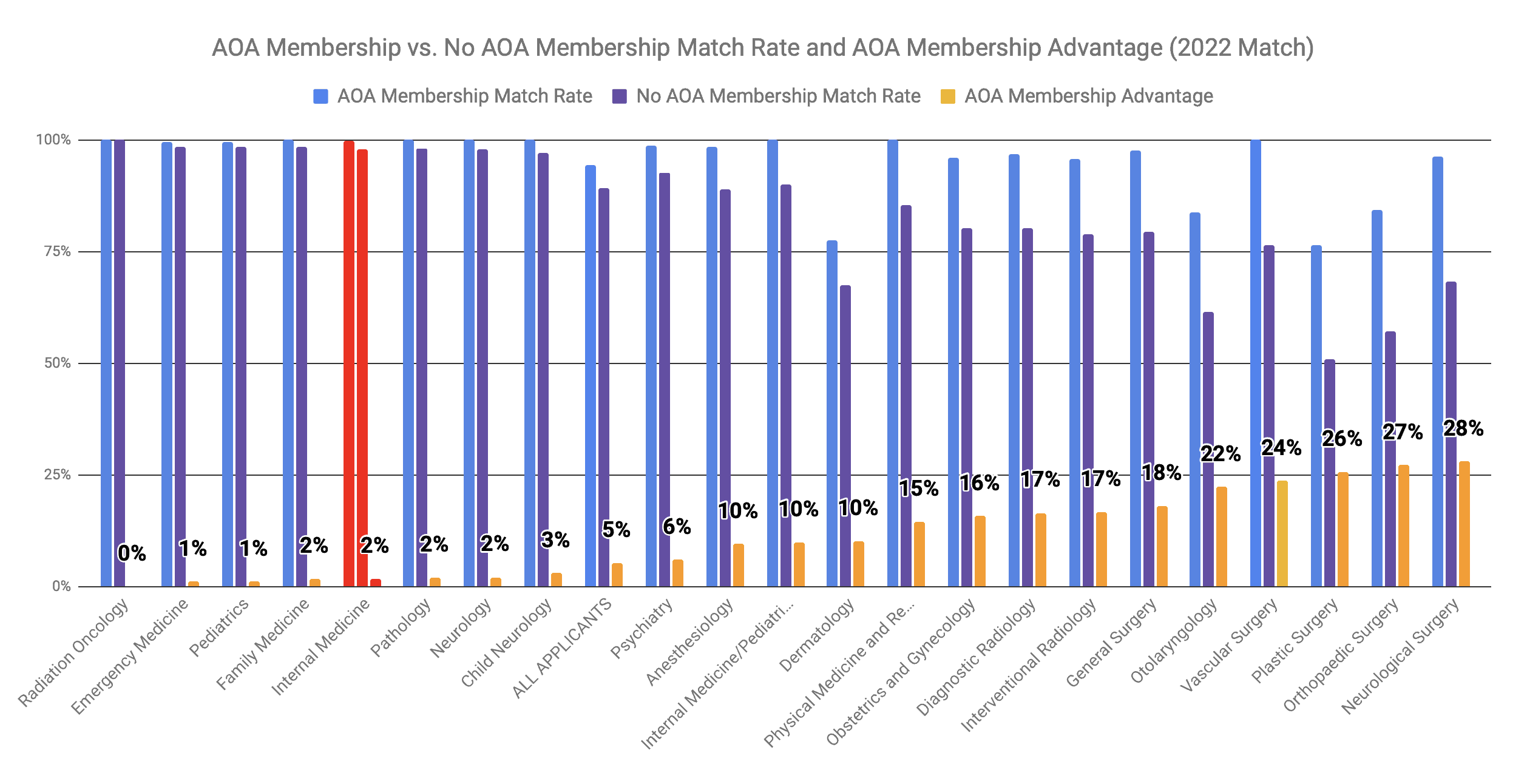
AOA membership correlated with a 2% match rate advantage for Internal Medicine in the 2022 Match
See this article for more on AOA medical schools and the importance of class rank for matching.
Do You Need to Attend a Top School to Become an Oncologist?
When pursuing a career in oncology, attending a top medical school can make a difference in matching into your desired specialty. According to a survey of program directors, over half of those surveyed reported considering applicants’ med school reputation when considering whom to interview, giving it an importance score of 3.8 out of 5.
Moreover, graduating from a school in the top 40 for NIH funding is associated with a 1% increase in the likelihood of matching into internal medicine as a field. This is potentially because top medical schools have more resources and access to clinical experience, which can help prepare students for the rigors of the specialty.
That said, it is important to remember that the name of the school alone does not guarantee success in any field. While attending a top medical school may have advantages, it is ultimately up to the individual to make the most of the opportunities presented. And while there is an advantage to being from a more prestigious institution, one’s record at the school will matter much more, including things like USMLE scores, class rank, and letters of recommendation.
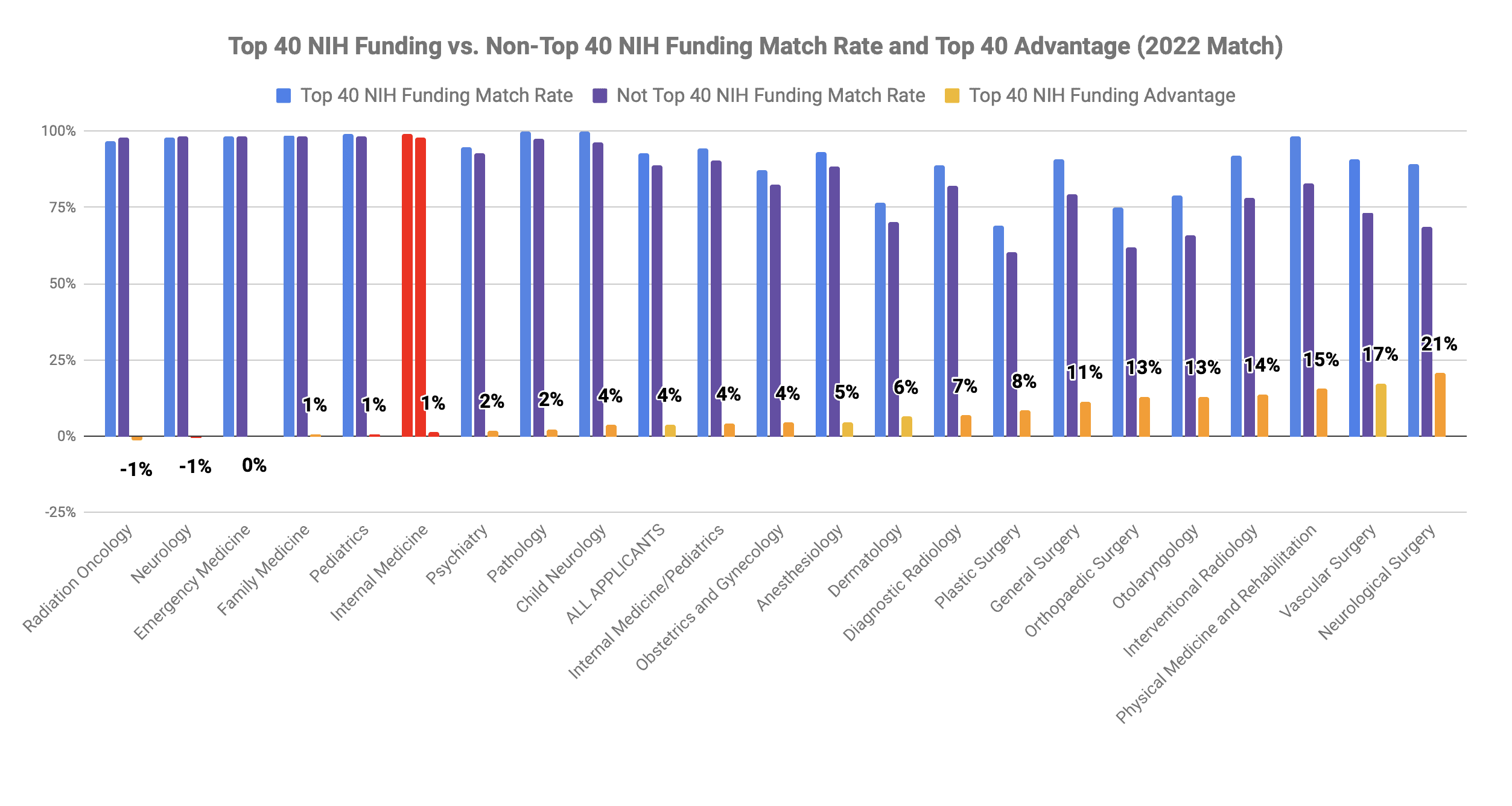
Graduating from a medical school ranked in the top 40 by NIH funding correlated with a 1% match rate advantage for Internal Medicine in the 2022 Match
Does an MPH or MBA Help You Become an Oncologist?
Medical training is long and arduous. Remarkably, many students consider completing other degrees before, after, or even while pursuing their medical studies. Degrees such as Master of Public Health (MPH) and Master of Business Administration (MBA) may seem attractive to potential internal medicine residents due to their additional qualifications. But do these additional degrees give applicants an edge in the residency application process?
The truth is that having an additional degree may not matter as much as one thinks. We crunched the numbers on the match rate for graduating students from MD schools for those with non-PhD other degrees vs. those that did not have a second degree. In internal medicine, the match rate was the same(0% advantage) for those with degrees like an MPH or MBA. This implies that having a second degree that isn’t a Ph.D. doesn’t appear to help your chances of matching into internal medicine.
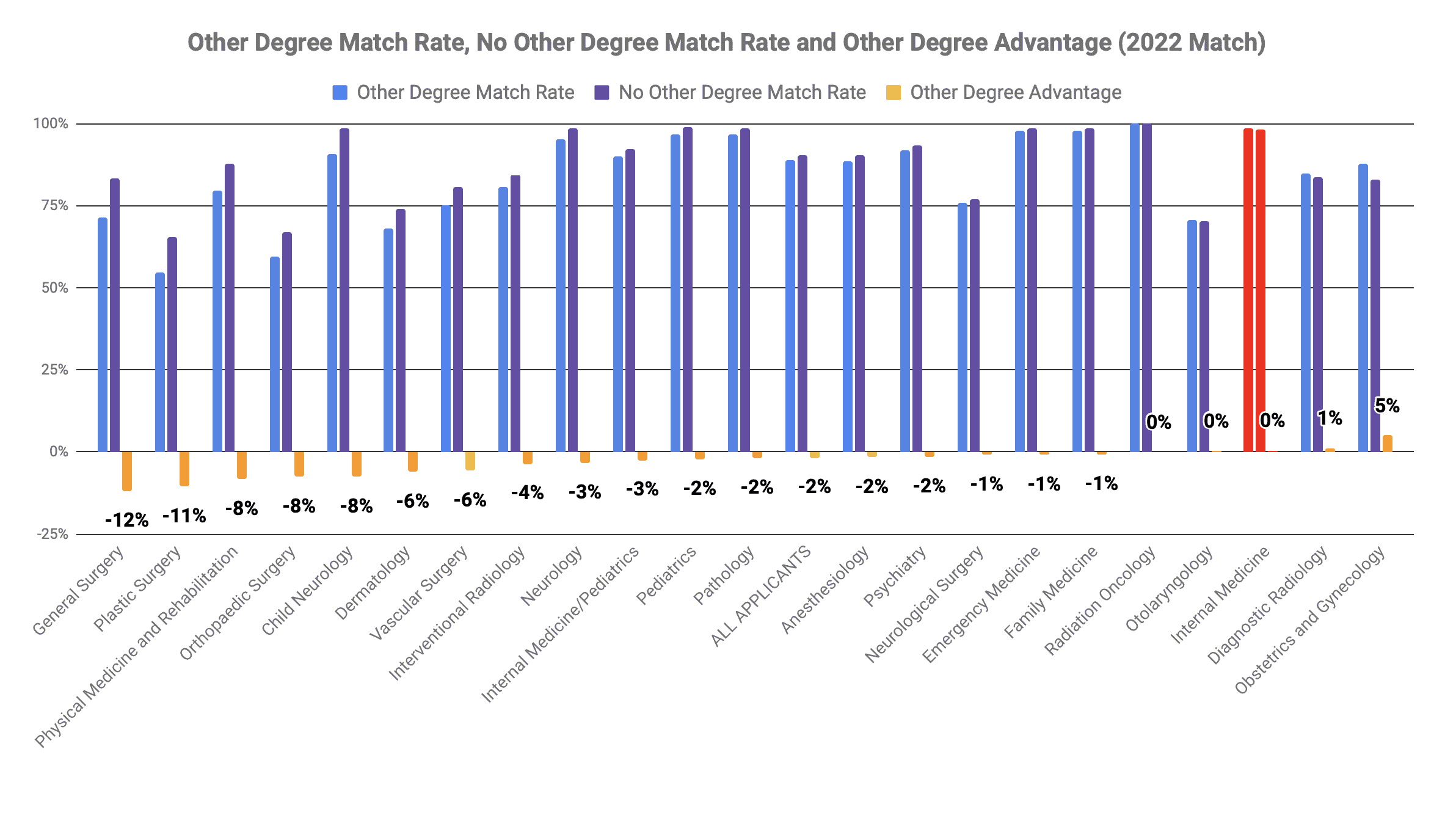
Having another degree like an MBA or MPH correlated with a 0% match rate disadvantage for Internal Medicine in the 2022 Match
It’s important to note that this study only looked at the overall match rates of medical students with another degree. The data doesn’t look at the type of degree, the school it was obtained from, and the quality of the applicant’s experience and credentials.
Having a second degree could open up some additional career opportunities. For instance, having an MPH or MBA may prove beneficial for those looking to go into healthcare administration or research.
Concluding Thoughts
Becoming an oncologist is a challenging but rewarding career path. It is perfect for those who love patient care, physiology, problem-solving, and working as part of a team in intense situations. With hard work, dedication, and a desire to help others, oncologists can make a real difference in the world of healthcare.
Looking for an Internal Medicine Residency Advisor?
Looking for an internal medicine residency advisor? Want help writing your personal statement? Need effective strategies for interviewing? Do you have things on your application – e.g., low USMLE scores, failed USMLEs, no research, IMG status, or others – you need help overcoming?
Be sure to check out our Residency Advisor service.

